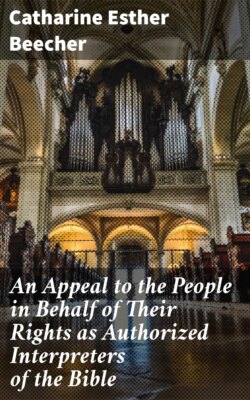Читать книгу An Appeal to the People in Behalf of Their Rights as Authorized Interpreters of the Bible - Catharine Esther Beecher - Страница 45
На сайте Литреса книга снята с продажи.
Dr. Edward Beecher.
ОглавлениеTable of Contents
“If any one would know the full worth of the privilege of living under, worshiping, loving and adoring a God of honor, righteousness and love, let him, after years of joyful Christian experience and soul-satisfying communion with God, at last come to a point where his lovely character, for a time, vanishes from his eyes, and nothing can be rationally seen but a God selfish, dishonorable, unfeeling. No such person can ever believe that God issuch; but he may be so situated as to be unable rationally to see him in any other light. All the common modes of defending the doctrine of native depravity may have been examined and pronounced insufficient, and the question may urgently press itself upon the mind, Is not the present system a malevolent one? and of it no defense may appear.
“Who can describe the gloom of him who looks on such a prospect? How dark to him appears the history of man! He looks with pity on the children that pass him in the street. The more violent manifestations of their depravity seem to be the unfoldings [pg 040]of a corrupt nature given to them by God before any knowledge, choice or consent of their own. Mercy now seems to be no mercy, and he who once delighted to speak of the love of Christ is obliged to close his lips in silence; for the original wrong of giving man such a nature seems so great that no subsequent acts can atone for the deed. In this state of mind, he who once delighted to pray, kneels and rises again, because he can not sincerely worship the only God whom he sees. His distress is not on his own account. He feels that God has redeemed and regenerated him; but this gives him no relief. He feels as if he could not be bribed by the offer of all the honors of the universe to pretend to worship or praise a God whose character he can not defend. He feels that he should infinitely prefer once more to see a God whom he could honorably adore, and a universe radiant with his glory, and then to sink into non-existence, rather than to have all the honors of the universe for ever heaped upon him by a God whose character he could not sincerely and honestly defend. Never before has he so deeply felt a longing after a God of a spotless character. Never has he so deeply felt that the whole light and joy of the universe are in him, and that when his character is darkened all worlds are filled with gloom.”
The following is from the Rev. Albert Barnes, a leading New School Calvinistic divine, and the author of a very popular Commentary on the Bible:
“That the immortal mind should be allowed to jeopard its infinite welfare, and that trifles should be allowed to draw it away from God and virtue and heaven; that any should suffer for ever—lingering on in hopeless despair amidst infinite torments, without the possibility of alleviation and without end; that since God can save men and will save a part, he has not purposed to save all; that on the supposition that the atonement is ample, and that the blood of Christ can cleanse from all and every sin, it is not in fact applied to all; that, in a word, a God who claims to be worthy of the confidence of the universe, and to be a being of infinite benevolence, should make such a world as this, full of sinners and sufferers, and then, when an atonement has been made, he did [pg 041]not save all the race, and put an end to sin and woe for ever;—these and kindred difficulties meet the mind when we think on this great subject. And they meet us whenever we endeavor to urge our fellow-sinners to be reconciled to God. On this ground they hesitate. These are real and not imaginary difficulties. They are probably felt by every mind that has ever reflected on the subject; and they are unexplained, unmitigated, unremoved.”
“I have never known a particle of light thrown on these subjects that has given a moment's ease to my tortured mind; nor have I an explanation to offer, or a thought to suggest, that would be of relief to you. I trust other men, as they profess to do—understand this better than I do, and that they have not the anguish of spirit which I have; but I confess, when I look on a world of sinners and of sufferers, upon death-beds and grave-yards, upon the world of woe filled with hosts to suffer for ever; when I see my friends, my parents, my family, my people, my fellow-citizens; when I look upon a whole race, all involved in this sin and danger, and when I see the great mass of them wholly unconcerned, and when I feel that God only can save them and yet that he does not do it—I am struck dumb. It is all dark, dark, dark to my soul, and I can not disguise it.”
This is but a brief specimen of the shuddering protest which has arisen in all ages and from all sects, against this stern and awful dogma, and which has poured its most powerful records from the shivering hearts of theologians themselves.3
